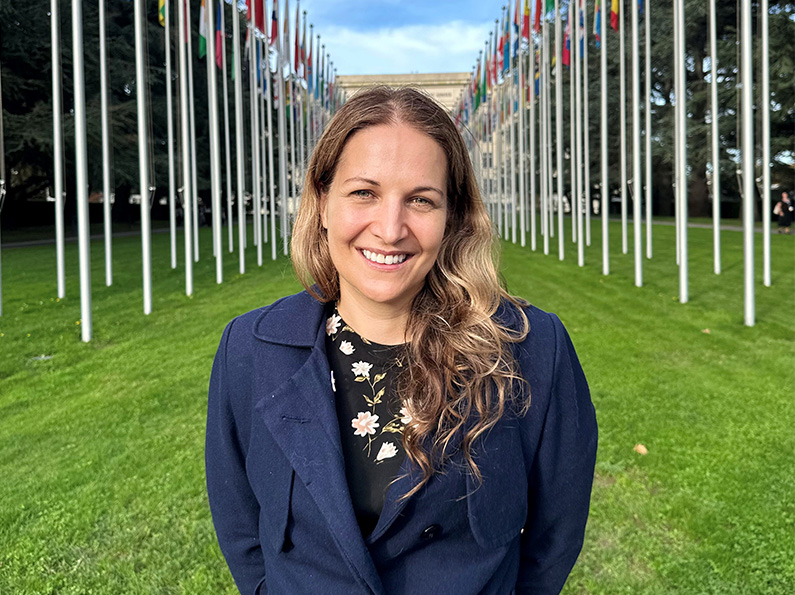Carrie Bryer is a former nursing and medical student who transitioned to a public health physician and medical officer of health. Read her journey from bedside care to community health advocacy, and how she is making an impact on public health policies and practices.
At a young age Carrie witnessed her father’s experience with cancer, a journey that saw her staying with various relatives in Dargaville during his treatment in Auckland. This exposed her to observing healthcare disparities faced by other whānau, and she began to question the barriers to receiving quality care. At the time, she put this down to money, lack of access, fear, wider whānau commitments and other complex issues. This early exposure sparked a fascination with the idea of improving health and wellbeing in her community, and she became a community advocate on certain health issues, such as ensuring access to accessible and affordable health services.
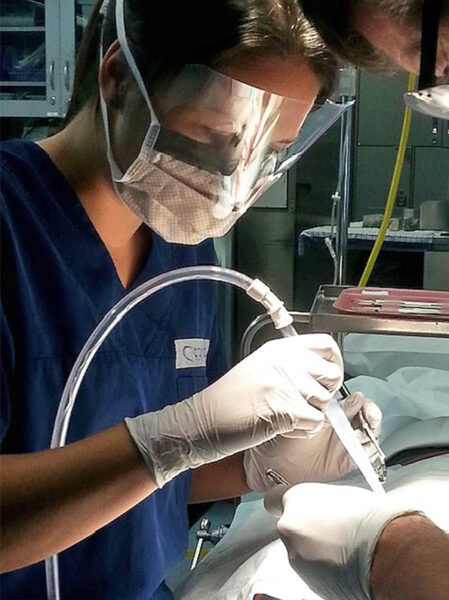 She was encouraged to pursue a career in health and in 2011 she completed her Bachelor of Nursing at the University of Auckland. “In my final year of nursing training, I was working in a very busy Emergency Department. It was during this time that I was thinking about a move into medicine. Although I was seeing and monitoring patients in the waiting room, there was only so much I felt I could do in my scope and many patients were experiencing long waiting times due to staff shortages. I thought about my community in Dargaville and how it presented a similar issue. I felt the best thing for my community would be to broaden my scope and train in medicine.”
She was encouraged to pursue a career in health and in 2011 she completed her Bachelor of Nursing at the University of Auckland. “In my final year of nursing training, I was working in a very busy Emergency Department. It was during this time that I was thinking about a move into medicine. Although I was seeing and monitoring patients in the waiting room, there was only so much I felt I could do in my scope and many patients were experiencing long waiting times due to staff shortages. I thought about my community in Dargaville and how it presented a similar issue. I felt the best thing for my community would be to broaden my scope and train in medicine.”
Carrie’s journey didn’t stop there. She continued her study and went to Auckland to attend medical school, determined to address systemic issues from a broader perspective. She completed a Bachelor of Medicine and Bachelor of Surgery in 2016. It was during this time as a medical student that her desire to learn more led her to working on the Mobile Surgical Unit – Te Waka Hauora, run by Mobile Surgical, for six weeks.
“My interest in working on the mobile surgical unit primarily stemmed from my rural background and my desire to learn more about the challenges in rural health,” Carrie begins. “Learning about how the surgical unit operated gave me a new perspective and opportunity to look at different ways of healthcare planning and service delivery. I learnt about healthcare funding, as well as understanding and appreciating differing healthcare models and resource constraints.
“Looking back on my time, I developed an appreciation for balancing healthcare resource with desired outcomes and that successful models of care include the ability to identify and develop services that meet the healthcare needs of that community.”
Her time on the surgical unit was pivotal, offering her firsthand experience to see the challenges rural communities faced. She actively engaged with community members and health care managers, delving into local issues and seeking innovative solutions. Through these interactions, she realised one significant realisation – the historical context of the rural hospital and community settings and how past healthcare decisions, such as the centralisation of services or funding, had impacted service delivery in those regions.
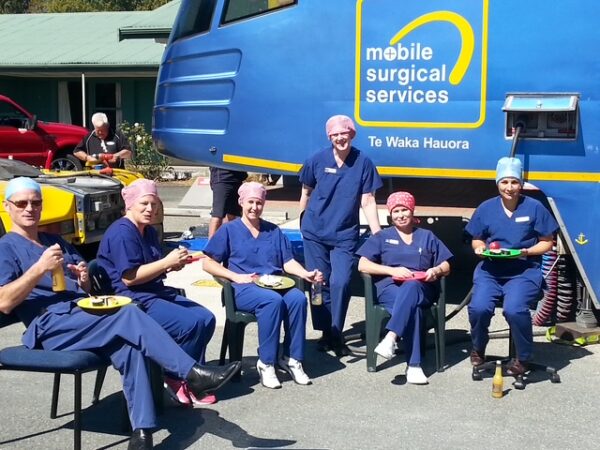 Simultaneously, she recognised the positive impact of the surgical unit on local health services. By providing mobile surgery services locally, it reduces the expenses relating to travel, accommodation, childcare, as well as reduce the need for time off work; ultimately making surgery more accessible and convenient for patients. Patients who can quickly and safely return to being a functional member of the community and regain health/wellbeing. “Many of the patients I met expressed they found the experience empowering by being able to remain in their clothes during the procedure, to see familiar staff faces onboard and being in familiar surroundings at their local hospital/community location,” she says.
Simultaneously, she recognised the positive impact of the surgical unit on local health services. By providing mobile surgery services locally, it reduces the expenses relating to travel, accommodation, childcare, as well as reduce the need for time off work; ultimately making surgery more accessible and convenient for patients. Patients who can quickly and safely return to being a functional member of the community and regain health/wellbeing. “Many of the patients I met expressed they found the experience empowering by being able to remain in their clothes during the procedure, to see familiar staff faces onboard and being in familiar surroundings at their local hospital/community location,” she says.
The surgical unit not only provides essential surgical services but also offers local nurses and doctors valuable opportunities for training and upskilling, so they themselves can give back to their own community and work as part of the team on the surgical unit.
“My time ‘on the bus’ also gave an appreciation for the importance of teamwork both between the regions through having and maintaining strong inter-service partnerships as well as innovative and motivated team members who lead by example. I was fortunate to travel, live and work closely with each team member. The concept of shared inter-professional leadership was prominent on the unit as it created an overall notion of respect, shared values and a sense of common purpose. These were qualities that I have reflected on and now use in my day-to-day practice as part of being an effective team member in solving public health issues.”
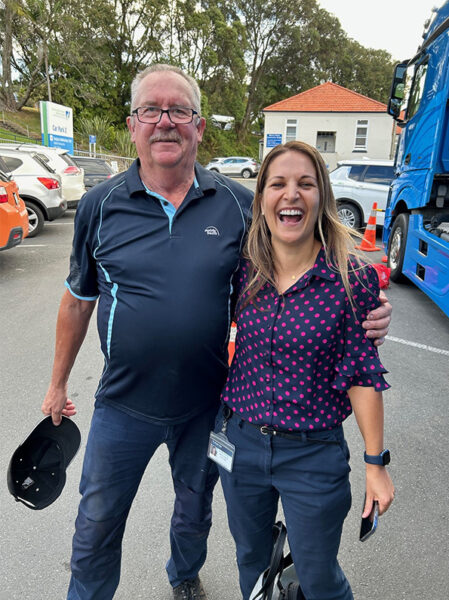 “Stepping outside of the hospital and spending time on the surgical unit I was able to think about location and environment. I started to see common patterns which I believe needed addressing before people entered through the hospital doors (if they could get there!). This led me to public health as I wanted to work on what is going on in our environment and improving health at the population level.”
“Stepping outside of the hospital and spending time on the surgical unit I was able to think about location and environment. I started to see common patterns which I believe needed addressing before people entered through the hospital doors (if they could get there!). This led me to public health as I wanted to work on what is going on in our environment and improving health at the population level.”
She believed that public health medicine was the field where she could tackle broader systemic challenges and understood that gaining a deeper insight into these wider impacts was essential for enhancing patient care.In her final two years of medical school, she completed her training at the base hospital in Whangārei in Northland and continued working for her house surgeon years. It was during this time she was able to work on weekends volunteering for her local Hato Hone St John Ambulance service.
Fast forward to today, Carrie works as a public health physician and medical officer of health working across Northland and Auckland. Her journey to date is enriched by her experiences on both a personal and professional level and is what profoundly shapes her role as a public health physician. These experiences collectively fuel her commitment to breaking down barriers to quality healthcare and advocates for inclusivity and accessibility, no matter where patients live. Mirroring that of Mobile Surgical’s foundation for equitable access to healthcare.
Carrie finds reward in collaborating with communities and supports change to give communities an opportunity to not only lead healthier lives but thrive in their environments. Her focus on long term gains ensures sustainable improvements and community resilience over time.
“The key goal in my area of work is to promote and protect wellbeing and prevent harm as we want to see people living happier, longer and more equal lives. I try to do a lot of strategic thinking around population health/community development and looking at social and environmental factors that impact on health outcomes.”
A few words of advice to anyone in nursing who is considering a transition to medical training or a career in public health, Carrie says “Everything is transferable. One thing I have realised in my journey is that regardless of scope, we all end up working together. There is so much that can be achieved in your current role just through relationship building and collaboration with others who all share a common drive in improving health care.”
Carrie’s journey reflects a deep commitment to making a meaningful difference in the healthcare system. Having just completed her specialist training this year, she says she feels like she is just beginning her career and that there is a lot of work to do.
So, what next for Carrie Bryers? “I’m going to spend the next while laying solid foundations in my career in public health. I am home in Te Tai Tokerau and connecting again with my Northland community. Once I have the groundwork laid, I will see where that path leads me next. It’s very exciting!”
Carrie also wrote a story for us for our regular newsletter in 2017 about her time spent working on the surgical unit. Read her story here.
(Main feature photo: Carrie standing at the Alley of the Flags at the entrance to the Palais des Nations, home to UN Geneva, in Switzerland)
(Top left photo: Carrie on the surgical unit assisting in dental surgery in Queenstown)
(Middle right photo: Staff lunch break at Motueka)
(Bottom left photo: Carrie with Gavin Hurring, one of Mobile Health Group’s drivers, at Whangārei base hospital)
